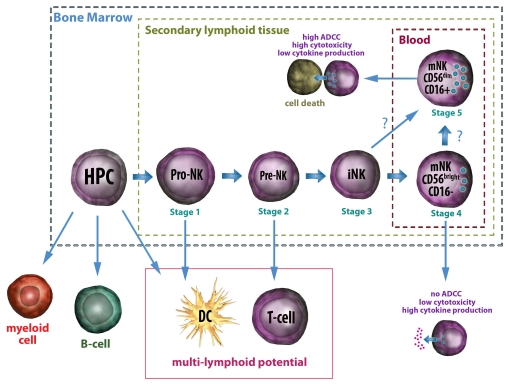Figure 1.
Proposed Natural Killer (NK) Cell developmental pathway in Humans. In the bone marrow, HPCs differentiate to form pro-NK cells which are able to differentiate into dendritic cells (DC), T cells and NK cells. It is proposed that some of these then migrate to the lymph nodes and tonsils, where they undergo further differentiation, whilst others remain and mature in the bone marrow. As pro-NK cells differentiate they gradually lose their ability to self renew and become more restricted in lineage potential. Immature NK (iNK) cells are restricted to form mature NK (mNK) cells but are themselves not functional. iNK cells differentiate into CD56bright CD16- mNK cells in vitro; however the precursors of CD56dim CD16+ remain uncertain. Following maturation, both CD16+ and CD16- mNK cells migrate to the blood. Here they play important roles in the immune response with CD16+ mNK cells being the main mediators of cytotoxicity and ADCC, and showing modest secretion of cytokines; whilst CD16- mNK cells appear to have a more immunoregulatory role, producing copious amounts of interferon-γ(IFN-γ) and other cytokines, but showing limited cytotoxic capabilities and an inability to perform ADCC.

